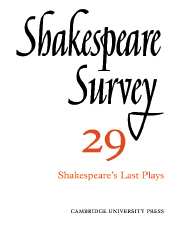Book contents
- Frontmatter
- Shakespeare’s Romances since 1958: A Retrospect
- Puzzle and Artifice: The Riddle as Metapoetry in ‘Pericles’
- ‘Pericles’ in a Book-List of 1619 from the English Jesuit Mission and Some of the Play's Special Problems
- George Wilkins and the Young Heir
- Theatrical Virtuosity and Poetic Complexity in ‘Cymbeline’
- Noble Virtue in ‘Cymbeline’
- Directing the Romances
- Shakespeare and the Ideas of his Time
- The Letter of the Law in ‘The Merchant of Venice’
- Shakespeare’s Use of the ‘Timon’ Comedy
- Re-enter the Stage Direction: Shakespeare and Some Contemporaries
- The Staircases of the Frame: New Light on the Structure of the Globe
- Shakespeare in Max Beerbohm’s Theatre Criticism
- A Danish Actress and Her Conception of the Part of Lady Macbeth
- Towards a Poor Shakespeare: The Royal Shakespeare Company at Stratford in 1975
- The Year's Contributions to Shakespearian Study 1 Critical Studies
- 2 Shakespeare’s Life, Times, and Stage
- 3 Textual Studies
- Index
- Plate Section
The Year's Contributions to Shakespearian Study 1 - Critical Studies
Published online by Cambridge University Press: 28 March 2007
- Frontmatter
- Shakespeare’s Romances since 1958: A Retrospect
- Puzzle and Artifice: The Riddle as Metapoetry in ‘Pericles’
- ‘Pericles’ in a Book-List of 1619 from the English Jesuit Mission and Some of the Play's Special Problems
- George Wilkins and the Young Heir
- Theatrical Virtuosity and Poetic Complexity in ‘Cymbeline’
- Noble Virtue in ‘Cymbeline’
- Directing the Romances
- Shakespeare and the Ideas of his Time
- The Letter of the Law in ‘The Merchant of Venice’
- Shakespeare’s Use of the ‘Timon’ Comedy
- Re-enter the Stage Direction: Shakespeare and Some Contemporaries
- The Staircases of the Frame: New Light on the Structure of the Globe
- Shakespeare in Max Beerbohm’s Theatre Criticism
- A Danish Actress and Her Conception of the Part of Lady Macbeth
- Towards a Poor Shakespeare: The Royal Shakespeare Company at Stratford in 1975
- The Year's Contributions to Shakespearian Study 1 Critical Studies
- 2 Shakespeare’s Life, Times, and Stage
- 3 Textual Studies
- Index
- Plate Section
Summary
Prominent among several new studies of the artistic conventions and historical contexts in which Shakespeare worked is L. Salingar’s comprehensive and masterly account of the traditions of comedy. Salingar’s main interest is in the plot conventions from which comedy derives its dual nature ‘as performance and as representation’, and he traces in detail four lines of genealogical descent that are combined in Shakespeare. The first of these involves a ‘reasoned speculation’ that there existed from the Middle Ages a continuous tradition of popular romance drama, secular and religious, which was Shakespeare’s ‘point of departure’. A full and perhaps disproportionately long discussion of the evolution of classical comedy focuses on the development of the intrigue-plot, with its ‘invitation to the audience to enjoy an exhibition of some form of deceit that distinguishes comedy from romance in the theatre’. Salingar points out that in learning ‘the pleasure of contrivance’ and ‘juggling with the complicity of the audience’ Shakespeare applied the principles of classical comedy to the Elizabethan popular stage more thoroughly than any of his predecessors. The festive element, much discussed in recent criticism of the comedies, is related here to the example of Italian Renaissance comedy in its association of deception, trickery and surprise with carnival masking, ‘an explosion of high spirits licensed and ratified by custom’.
- Type
- Chapter
- Information
- Shakespeare Survey , pp. 157 - 167Publisher: Cambridge University PressPrint publication year: 1976



